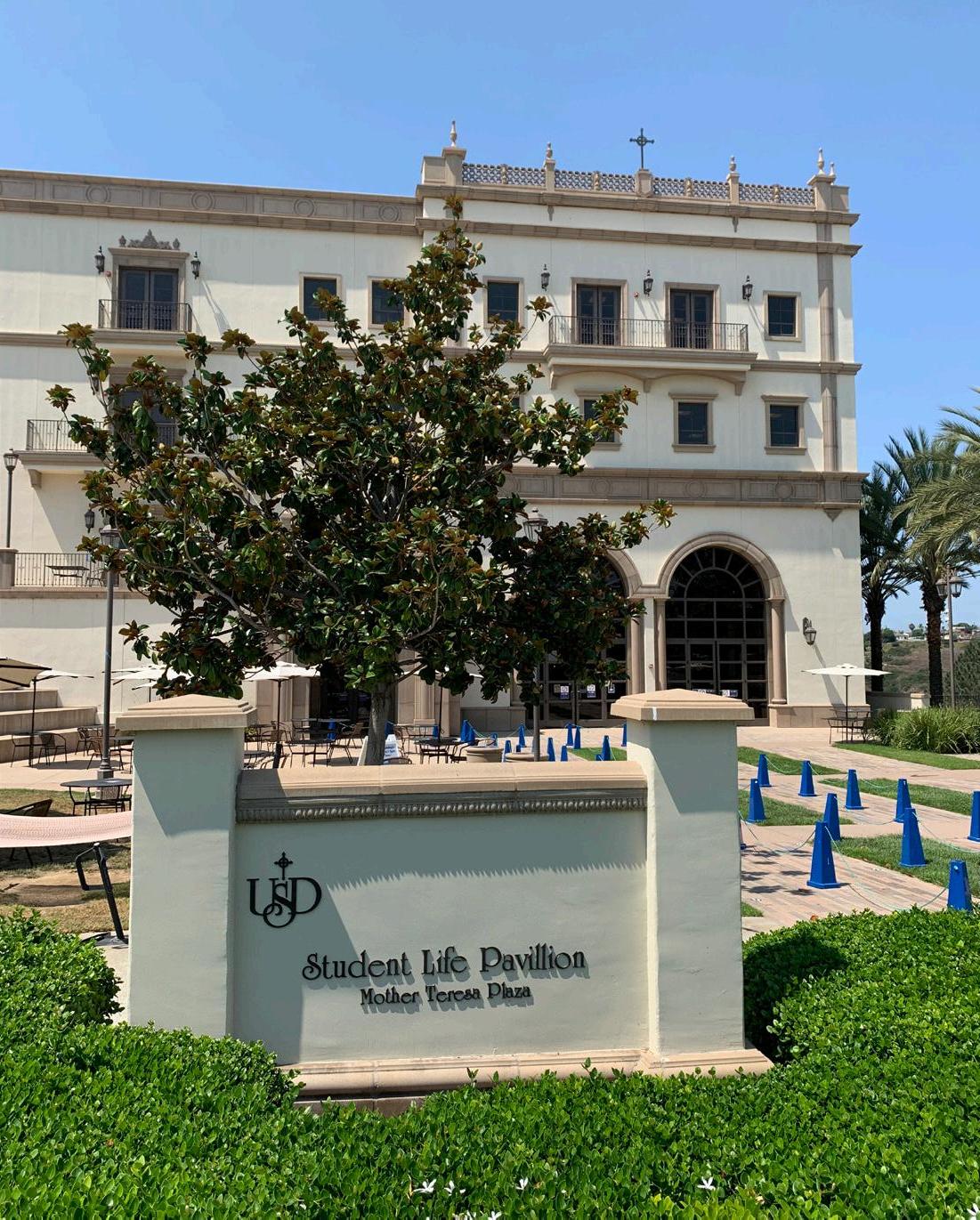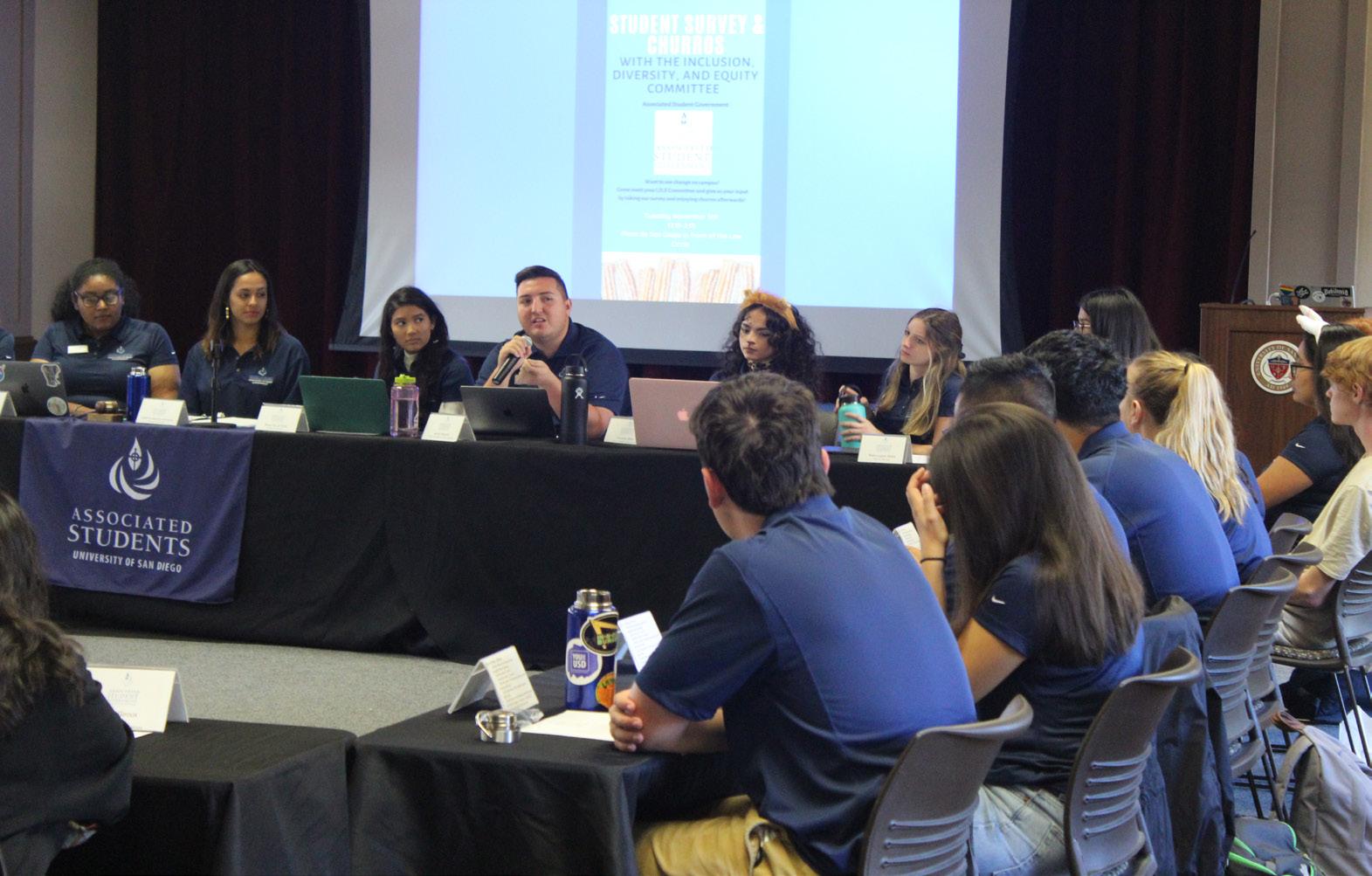
10 minute read
OPINION
from Volume 58 Issue 3
USD’s premature opening is unsafe for students and faculty alike
Harris’ decision to reopen campus in September shows a prioritization of money over health
Advertisement
WHITNEY LYNN CONTRIBUTOR
The University of San Diego seems to change their COVID-19 plan every other week. On May 7, President James T. Harris III, D.Ed. sent out an email to the USD population, bringing forth a six-point plan to keep students safe when they return to campus. This email stated the university’s intention to reopen in August, which was unexpected as many universities across the country began plans to be fully remote for at least the fall semester.
On July 9, Harris sent another email reiterating the six-point plan and the goal of getting students back on campus. The email did state that a hybrid learning model would be implemented, meaning some classes would be online while others would continue to meet in person. This plan did not last long. Harris sent another message on July 29 stating that USD would be fully remote.
This seemed like the end of the back and forth, for at least the first semester. However, Harris announced on Aug. 28 that there will be a limited return to campus beginning Sept. 18. This decision comes across as an opportunistic play for money and displays lack of concern for both USD students’ and San Diego county’s health.
Being on campus is a huge part of one’s “college experience.” None of us envisioned our lecture classes to be pre-recorded videos we would watch in our bedrooms. We hoped to be sitting in a classroom with other students and our professor present. The reason so many USD students, along with myself, chose this institution was for the small classroom sizes. These small classes allowed students to make close connections with their professors and other students. Out of everything we are “losing” this semester, I believe that is the greatest detriment to our learning. Some students think it’s good USD is trying
so hard to get students back on campus. They miss their friends, the beautiful campus, the college atmosphere, in-person classes, and of course the beach. However, just because we miss our lives does not mean the pandemic is over. I would be lying if I said I didn’t want to sit in an overheated classroom in Camino right now, but my desire to do what is best for my health and the community’s health is greater. It would be great to be back, but I know it Con’t on Page 6
USD’s plan to bring students back as soon as they are able to according to county guidelines might seem like a welcome choice, but as outbreaks continue to occur at universities across the country the move seems questionable at best. Mikaela Foehr/The USD Vista
Your news in your hands
@usdvista @theusdvista
From Page 5 wouldn’t be safe.
Across the nation we are seeing colleges suspending in-person classes within the first few days of students being there due to rapid increase in cases. In our own city, San Diego State University has halted in person classes due to a case spike amongst students and faculty.
“We are also closely monitoring universities across the country who are reversing decisions to bring students back on campus, and hope to learn how best to mitigate the spread of COVID-19 and reduce the likelihood of a similar scenario from happening at USD,” Harris said in a recent email to the USD community regarding reopening sent on Aug. 28. The lesson learned from colleges sending students home is you cannot trust college kids to follow the rules. There is no way to ensure all students will follow social distancing guidelines. All it takes is one party, and USD could have an outbreak.
“Please note that the university does not intend to close the campus if county or state COVID-19 data reflect a growing trend of cases or outbreaks,” Harris said in his last email about reopening. This shows a blatant disregard for health and safety to leave the campus open, knowing that there is an increase in cases. It seems that the university’s plan, if there was a COVID-19 outbreak on campus, is to do nothing.
San Diego County was just taken off California’s COVID-19 watchlist, so why is Harris trying so hard to get us put back on? Not being on the watchlist does not mean we are in the clear. San Diego is still under stay-at-home orders. Now is the time to remain vigilant, so we will not lose this hard earned progress.
“A vast majority of courses will continue under remote instruction for the remainder of the fall semester,” Harris said.
If most classes remain online, what is the point of returning? Why pay $12,980 to sit in a dorm room on your laptop? The decision to move students back onto campus a month into the semester with only two months remaining comes across as reckless and desperate, with little regard to the health of students or faculty.
The views expressed in the editorial and op-ed sections are not necessarily those of The USD Vista staff, the University of San Diego, or its student body.
Oh, to be rich, famous, and powerful: Lori Loughlin’s two month prison sentence
As the rich and powerful are able to skate past criminal offenses with little more than a slap on the wrist, it seems unlikely that the rest of us could get away with the same.
TAYLOR DEGUZEMAN A&C EDITOR
Imagine a perfect world where trying “hard” ceased to exist. You didn’t have to build a strong resume to get your dream job; you got your dream job because of who you are. You didn’t need to work tirelessly from 9-5 to make money to support yourself; you have all the money you could ever ask for. Even craziest of all, instead of indebting 18 years of your life volunteering, working, being a student, facing adversities, playing sports, participating in musicals, sculpting the perfect enough version of yourself to fill the void of possibly not getting into that prestigious dream college of yours, instead of all of that, you just got in, plain and simple because of who you are. But, only in a perfect world right? Wrong. Olivia Gianulli and Isabella Gianulli, daughters of Full House’s Lori Loughlin, did just that.
During the 2019 ‘Varsity Blues’ college admissions scandal, several individuals were accused of criminal conspiracy in bribing undergraduate admissions decisions at several top, prestigious universities. Of those accused, the most high profile names involved were Loughlin and her husband, Mossimo Giannulli. Loughlin and Gianulli were accused of paying $500,000 to the founder of The Edge College & Career Network, Rick Singer.
The bribery successfully landed Olivia and Isabella Gianulli, their daughters, acceptances into the University of Southern California (USC), under false crew (rowing) team credentials. To think that neither of the girls played the sport competitively means that they took two viable spots on the rowing team that could have gone to prospective USC crew recruits.
After both parents plead guilty to the charges in May 2020, it was recently released that Loughlin would serve a two month prison sentence on top of two year supervision, complete 100 hours of community service and pay a fine of $150,000. Her husband, who committed an additional count of honest services fraud on top of what his wife committed, will serve a five month prison sentence on top of two year supervision, 200 hours of community service, and pay a fine of $250,000.
It is interesting to see the situation from the perspective that Loughlin and Gianulli merely acted

out of sheer love for their children. Through a muddled lens, one could make the argument that they wanted to give their daughters the best possible college experience: a taste of “normal life” away from paparazzi and the glamour of Hollywood. In a way, it is difficult to even grasp the amount of money and net worth that both Loughlin and Gianulli have. It is difficult to grasp the implications of being worth so much, and the power behind having $500,000 to spare just to get your child into any college of their choice. Con’t on Page 8
Lori Loughlin’s light sentence compared to those of less privileged individuals seems to indicate that money really does make the world go round. Photo courtesy of Alexander Schimmeck/Unsplash
From Page 7
This case hits home with USD also being involved in the college admissions scandal. Though Loughin and Gianulli are well-known, high-profile names involved in the scandal, other individuals not as involved in the public eye contributed as well. Namely, Robert Flaxman, a former father of a USD engineering student, pled guilty to paying $75,000 in order to fabricate his daughter’s ACT scores, which were sent to USD.
The case not only concerned his daughter, but also his son, as well as Martin Fox and former USD men’s basketball head coach, Lamont Smith. According to the U.S. Department of Justice, Fox facilitated bribes paid for by Flaxman and received by Smith in order to designate the son and daughter as a basketball recruit and team manager. Both Flaxman’s son and daughter received admission, but only his son decided to attend USD as an Industrial and Systems Engineering major for three years. The son no longer attends USD. Flaxman was sentenced to one month in prison on top of a $50,000 fine and 250 hours of community service.
Another case involving a mother from La Jolla, Elizabeth Kimmel, who was accused of paying $475,000 to Singer, the founder of the College and Career Network used to bribe admissions, is set to go to trial in January 2021 after Loughlin and Gianulli go to trial. Singer promised Kimmel that he would get her children into Georgetown and USC by boosting their qualifications.
A child only hopes that their parents would do anything to make them happy. But paying thousands and thousands of dollars to admit your kids to a prestigious university is crossing all the lines of fairness, morale and integrity. Dismissing the amount of hard work and dedication that goes into college admissions, let alone the blood, sweat, and many many tears that go into preparing to apply for colleges, solely because you have the wealth and power to do so, is crossing every line in the book.
The year before college applications are due, some students spend countless hours in SAT or ACT prep classes, preparing to take a standardized test that will, in some cases, make or break their college decision. The summer before college applications are due is one of the most stressful times of a student’s high school career. One can find themselves writing and rewriting and revising a multitude of personal essays and statements for months to get the perfect essays that make them stand out amongst millions.
Not taking into consideration the years and years of dedicating one’s life to a sport, passion or project, and only thinking about the year a student spends focusing on college admissions, a two-month and even fivemonth sentence pale in comparison to that one year.
Would you or I receive such a light sentence? Would someone way less privileged, less high profile, less famous, receive this sentence? I feel that the answers are undoubtedly no.
In 2016, a Texas mother was sentenced to five years in prison for voting illegally during the 2016 election. Crystal Mason, an African-American mother of three, voted while on probation, after being released for serving prison time due to tax fraud in 2012. Under Texas law, a felon on supervision is ineligible to vote. Mason was unaware of this and her probation officer never told her that she could not vote due to her status.
Mason was unaware that her actions were illegal; Loughlin was aware.
There is a distinct difference between a twomonth sentence and a five-year sentence. There is a distinct difference between unknowingly committing a crime under Texas law by exercising one’s right to vote, and purposefully committing criminal conspiracy in bribing college admissions to acquire acceptances from prestigious colleges and universities.
Our justice system rewards the rich and powerful while harming and punishing the poor or less fortunate. Our justice system is supposedly founded on fairness, in treating the rich and poor equally. But in several situations, and especially this one, it seems that fairness is dealt out according to who is fortunate enough to pay for their crime. In this not so perfect, perfect world it appears to be the case that the rich and powerful merely receive a slap on the wrist, a month or so in prison, and get to live out the rest of their life, whereas the poor and less fortunate much rather stay in prison then live in debt for the rest of their lives paying probation bills.






